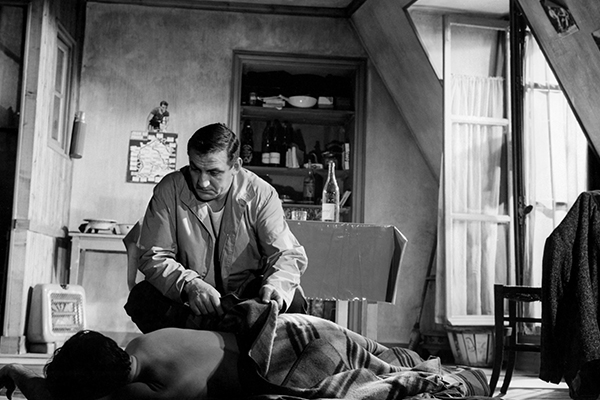Gilles Grangier and Michel Audiard, A very French thriller
PostED ON OCTOBER 11 AT 9:30 AM
In 125 rue Montmartre (1959), Gilles Grangier and Michel Audiard, who wrote the brilliant dialogues, plunge Lino Ventura into a tightly constructed social thriller, which describes the working-class Paris of the late 1950s with finesse.

Pascal (Lino Ventura) is a solitary and taciturn newspaper seller, who leads a quiet existence in Paris between his work, his meetings at the local bistro and his nights in the arms of his mistress, the tender and sensual "Memène" (Dora Doll). One day, Pascal saves Didier (Robert Hirsch), a stranger with suicidal tendencies, from drowning; Didier will use Pascal’s naivety to drag him into a dark and wild adventure of crime.
In 1959, Gilles Grangier had already made thirty-four films in his sixteen-year career, when he set about adapting 125 rue Montmartre, a novel by André Gillois published the same year, crowned with critical success - the work notably received the Quai des Orfèvres Prize. At the dawning of the New Wave, the prolific director (sixty-six feature films total) was in the midst of a key period of his filmography, focused on film noir. Five months earlier, The Magnificent Tramp (Archimède, le clochard), his previous film, had won Jean Gabin the Silver Bear for Best Actor at the Berlin Film Festival.
Beyond merely transcribing the crime intrigue of the book, Gilles Grangier's ambition was to portray, without miserabilism, the working-class life of newspaper vendors, by filming in a non-condescending way. To this end, the sets of the feature film and its gallery of supporting characters (as well as its extras, which helped plunge the film into the realistic atmosphere of the Paris of "simple people") were explored down to the tiniest detail. “This has always been important to me. We have to understand how guys live, how they eat, how they screw”, explained the director, whose title of the feature film refers to the historic address of the Nouvelles messageries de la presse parisienne, the large distribution centre where the newspaper sellers came to pick up their daily supplies.
Masterfully crafted by Michel Audiard, the dialogues, delectable at times, of 125 rue Montmartre complement the lively and rhythmic adaptation imagined by the filmmaker, who had by then already collaborated seven times (since Poisson d'Avril, 1954) with the famous scenario and dialogue writer. "For me, there is only one serious thing in life: it's mealtime, and every now and then sex, but as long as you don't give a damn about it!” Pascal grumbles in one of the movie’s famous lines.
For 125 rue Montmartre, the duo moves away from the American spin on the genre and subscribes to the precepts of the French thriller, where each stage of production, from the directing to the editing, is handled with the same thoroughness. Unfortunately, the release of this dark yet humanist film was overshadowed by the explosion of the New Wave (The 400 Blows - Les 400 coups - by François Truffaut was released that year). Magnificently carried by the endearing duo of Robert Hirsch and Lino Ventura, the latter takes advantage of his role as a naive, gruff man with a tender heart to quell his image of the eternal brawler. The cast also includes Andréa Parisy, who perfectly embodies Catherine, a cold and calculating bourgeoise.
Benoit Pavan

